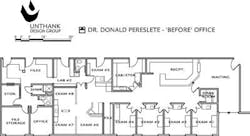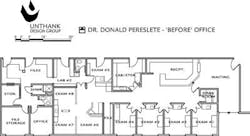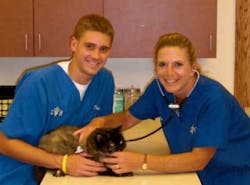Perio prevention and more for pets
A state-of-the-art veterinary hospital in Cincinnati, Ohio, just celebrated its 50th anniversary. Home to one of the most progressive dental suites in the nation, Grady Veterinary Hospital is a huge promoter of dental education.
The hospital is exceptionally equipped with advanced technology. Midmark partnered with Grady to provide equipment for the dental suite.
Jamie Renner, Midmark’s Market Manager, Veterinary Products, says: “Midmark is committed to developing solutions specific to the needs of veterinarians and their staffs. A critical component of this development process involves partnering with clinics in order to observe procedures. This allows us to test concepts in order to ensure new product ideas meet and surpass the expectations of the veterinary market. The work at Grady Veterinary Hospital is an example of that successful partnership specifically focused in the area of veterinary dentistry. What we learned from Grady and other clinics around the country went into the design of the key components now being successfully used at Grady to deliver better, more efficient dental care to their patients.”
Dr. James Auvil, a board-certified veterinary dentist, began practicing at the hospital in 1986. There are fewer than 100 board-certified veterinary dentists in the world. Dr. Auvil realized that pets would live much longer, happier lives if their teeth and mouths were taken care of properly.
Grady Veterinary Hospital treats “anything with fur that is a domestic animal” – canines, felines, rabbits, guinea pigs, gerbils, and the like. Averaging 96 patients per day, the full-service hospital treats everything from puppy/kitten vaccines to gunshot wounds. The most common procedures include spays, neuters, dental cleanings, and laceration repairs. There is always a veterinarian on site.
Over the years, technology in veterinary dentistry has changed through the diagnostics that are performed. Today, veterinarians use the periodontal probe and oral radiographs to diagnose dental disease. Eighty percent of dogs and 70% of cats develop signs of periodontal disease or gingivitis before they reach age 3.
Dr. Auvil offers these tips for good oral care for pets:
Dental exams and cleaning should be a part of a pet's regular veterinary visit. In between professional (by a veterinarian) cleanings, the owner should be adopting an oral home-care plan. This plan should involve brushing your pet's teeth (with a toothpaste for pets, NOT human toothpaste), special dietary aides, and products for oral care.
Grady Veterinary Hospital employs approximately 50 staff members and is open and fully staffed 24 hours a day, seven days a week, 365 days a year. You may contact the hospital by phone at (513) 931-8675, or visit www.gradyvet.com.






